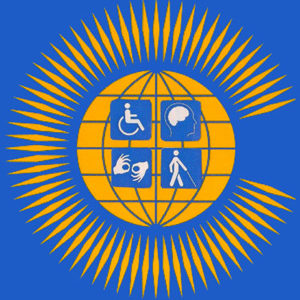The Commonwealth Parliamentarians with Disabilities (CPwD) network has published two new toolkits as part of its Disability Inclusive Communications Guidelines. These toolkits on ‘Facilities of Inclusion’ and ‘Linguistic Principles’ provide guidance to Commonwealth Parliaments and Legislatures on how to enhance and sensitize their communications with persons with disabilities.
Parliamentarians with disabilities are represented in national, sub-national, provincial and territorial Parliaments across the Commonwealth and across the nine Regions of the Commonwealth Parliamentary Association (CPA). The CPwD network provides a means of supporting the capacity of Parliamentarians with disabilities to be more effective in their roles and helping to improve the awareness and ability of all Parliamentarians. The network also encourages all Parliamentarians to include a perspective mindful of disabilities in all aspects of their role – legislation, oversight and representation – and helping Parliaments to become institutions that are sensitive to issues surrounding disabilities.
The CPA Headquarters Secretariat has conducted research amongst its membership of 180 Commonwealth Parliaments and Legislatures as well as non-governmental organisations to create these two Disability Inclusive Communications Guidelines for Parliaments. The guidelines provide various examples of best practices that can be adopted by both Parliaments and Parliamentarians in order to continue to ensure that they sensitively address Parliamentarians and parliamentary staff with disabilities.
The CPA Secretary-General, Stephen Twigg welcomed the launch of the new inclusive guidelines for Parliaments and said: “The inclusion of Parliamentarians with disabilities is of vital importance to advancing parliamentary democracy across the Commonwealth and is a key priority of the Commonwealth Parliamentary Association. The two new guidelines will support CPA Branches in becoming more ‘disability confident’ in their communications with and about Parliamentarians with disabilities across the Commonwealth.”
The Speaker of the Nova Scotia House of Assembly and CPA Executive Committee Regional Representative for the CPA Canada Region, Hon. Kevin Murphy, MLA contributed the forewords for the two guidelines and said: “Giving a meaningful voice to persons with disabilities (PWDs) in Parliaments and Legislatures leads to improvements in the following three functions of a Parliament. Oversight will be more comprehensive; representation will be more equitable; and legislating will be more sensitive.”
Copies of the guidelines are attached to this email. You can also click here or visit www.cpahq.org/cpahq/disabilitiesresources to download a copy of one of the Disability Inclusive Communications Guidelines.
-ENDS-
The Commonwealth Parliamentarians with Disabilities (CPwD) was founded in 2017 to support elected representatives with disabilities in Parliaments and legislatures across the Commonwealth and to ensure that issues of persons with disabilities are brought to the fore in parliamentary debate and legislation. The network campaigns for equality for persons with disabilities in all spheres. Visit www.cpahq.org/cpahq/disabilities.
The Commonwealth Parliamentary Association (CPA), now in its 109th year, exists to develop, promote and support Parliamentarians and their staff to identify benchmarks of good governance and to implement the enduring values of the Commonwealth. The CPA is an international community of over 180 Commonwealth Parliaments and Legislatures working together to deepen the Commonwealth’s commitment to the highest standards of democratic governance. The Commonwealth Parliamentary Association (CPA) Executive Committee is the principal governing body of the Association and includes Commonwealth Speakers and Members of Parliament. Visit the CPA Headquarters Secretariat website at www.cpahq.org.
